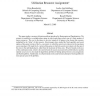107
click to vote
JDA
2006
15 years 2 months ago
2006
This paper studies a resource allocation problem introduced by Koutsoupias and Papadimitriou. The scenario is modelled as a multiple-player game in which each player selects one o...
142
click to vote
DAGSTUHL
2007
15 years 3 months ago
2007
Following recent interest in the strong price of anarchy (SPOA), we consider this measure, as well as the well known price of anarchy (POA) for the job scheduling problem on two u...
91
Voted
CAAN
2004
Springer
15 years 5 months ago
2004
Springer
It is well known that the selfish behavior of users in a network can be regulated through the imposition of the so-called optimal taxes on the network edges. Any traffic equilibriu...
108
click to vote
PODC
2010
ACM
15 years 6 months ago
2010
ACM
We quantify the effect of Bayesian ignorance by comparing the social cost obtained in a Bayesian game by agents with local views to the expected social cost of agents having glob...
MFCS
2004
Springer
15 years 7 months ago
2004
Springer
Abstract. In this work, we consider an interesting variant of the wellstudied KP model [18] for selfish routing that reflects some influence from the much older Wardrop model [3...
116
click to vote
SIGECOM
2009
ACM
15 years 8 months ago
2009
ACM
We study the relationship between the social cost of correlated equilibria and the social cost of Nash equilibria. In contrast to previous work focusing on the possible benefits ...
122
Voted
WINE
2009
Springer
15 years 8 months ago
2009
Springer
Mediators are third parties to whom the players in a game can delegate the task of choosing a strategy; a mediator forms a mediated equilibrium if delegating is a best response for...
119
click to vote
STOC
2005
ACM
16 years 2 months ago
2005
ACM
We consider the price of anarchy of pure Nash equilibria in congestion games with linear latency functions. For asymmetric games, the price of anarchy of maximum social cost is ( ...

